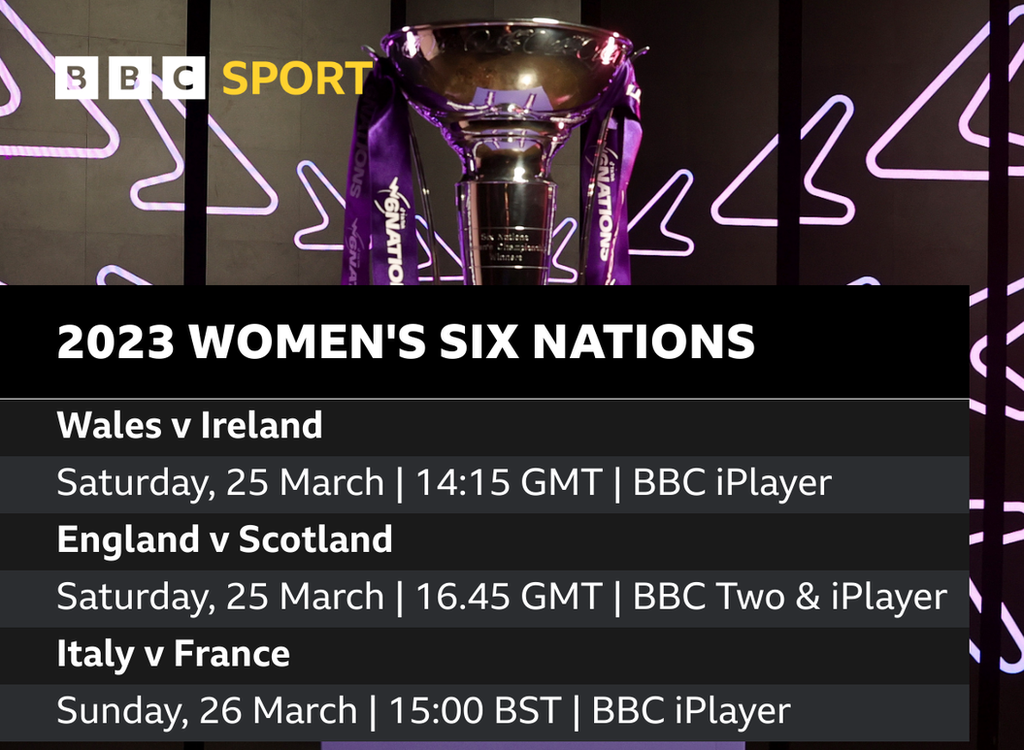Women's Six Nations 2023: Why women's rugby is booming this year
- Published

England are seeking a fifth successive Women's Six Nations title in 2023
So many women's rugby records have fallen in the past year, it can be hard to keep up.
In the 2022 Women's Six Nations, England played to a record home crowd of 14,689 one week, then surpassed that when 15,836 turned up the next.
Later that year, 42,759 were present to see New Zealand win the World Cup final against England.
That is the current world record attendance for a women's game but the mark could be beaten before the 2023 Women's Six Nations is over.
As the development of women's rugby gathers pace, BBC Sport looks at why the sport is booming.
Women's Six Nations stands alone
Many of the recent developments in the Women's Six Nations could be down to the fact that it is now played in its own window after the men's tournament has finished.
Previously, both tournaments were played at the same time leading to some unappetising kick-off times for women's matches with audiences sometimes being forced to choose between tournaments.
Departing Six Nations chief executive Ben Morel told BBC Sport the separation of the tournaments was one of the things he took the most pride from across his tenure.
Morel said the new schedule allowed organisers "to do so much more" with the tournament. Those changes have included scheduling the match between England and France - usually the decider - for the final round in the 2022, 2023 and 2024 tournaments.
In 2020, England beat France in the opening game before then easing to the title whereas putting that game at the end allows tension to build.
Paid to play
All teams in the 2023 tournament will be offering contracts to the majority of their players for the first time and Morel said the timing of increased professionalisation and the spotlight of separate scheduling "can't be just a coincidence".
England have been professional since 2019 and France's contracts, which cover 75% of their time, are also well established. Those two sides have won every Women's Six Nations title since 2016.
There is hope that the other teams will catch up, with Wales getting contracts for the first time at the start of 2022 and Ireland, Scotland and Italy all following suit in the past year.
Scotland captain Rachel Malcolm said contracts had already made a "huge difference".
"The most exciting thing for me is that wee girls in Scotland can say, 'I want to be a professional rugby player'," she said.
"We didn't have that."
With those on the pitch better supported, the next step will be having women in top-level coaching jobs.
Ireland backs coach Niamh Briggs and France head coach Gaelle Mignot are the only women coaching in the tournament this year, with players Abbie Ward and Emily Scarratt shadowing England's coaching staff as they miss the tournament because of pregnancy and injury respectively.

Wales v Ireland will be on BBC Radio 5 Sports Extra and England v Scotland will be on 5 Live
Battle between two
Wales may be most likely to close the gap with England and France given they have had contracts the longest among the four chasing unions.
Morel said his team track scorelines, the points gap between teams in matches, "to see if development is moving in the right direction".
Four of the 15 matches in 2022 had a difference of seven points or fewer. The average scoreline in the tournament has been fairly stable over the past four years, standing at 28 in 2019, 27 in 2020, 33 in 2021 and 28 in 2022.
England have contributed to the biggest gulfs, beating Italy 74-0 and Ireland 69-0 in 2022.
Scotland's Malcolm said she was hopeful that 2023 would "be the most wide-open tournament so far", but added: "It's probably too soon to close that gap [with England and France] off the back of professionalism."
Ireland captain Nichola Fryday is optimistic, saying: "It's only a matter of time before you can't write off those top two positions at the start of the Six Nations because every team will be really competitive. It's going to happen a lot sooner than people think."
I want to finish off at the top - Hunter
Women's game breeds new fans
England's success, including a 30-Test winning streak that led them to last year's World Cup final, has contributed to increased interest.
The Red Roses will play a first standalone game at Twickenham in their final-round match against France on 29 April.
With 40,000 tickets already sold, that game could pass the record attendance for a women's game of 42,759 set at Eden Park last year.
The Women's Six Nations has said there was a 70% increase in match attendance and 135% increase in television ratings in 2022 while it seems the women's tournament helps win over new rugby fans too.
Women's Sport Trust (WST) data has shown there were one million fans who watched at least three minutes of the women's event live but did not watch the men's tournament in 2022.
The audience for the women's tournament was also more diverse, with WST finding an increased proportion of black, Asian and minority ethnic viewers, and a greater proportion of viewers aged 35 and under, compared with the men's event.
These audience statistics perhaps demonstrate why the Women's Six Nations attracted a first title partner in 2022, when TikTok came on board.
Financial details of the deal have not been shared, but TikTok's sports marketing lead in Europe Harley O'Dell said the company had helped the tournament "reach a younger demographic" and "enter cultural conversations beyond the pitch" to "speak to new fans".
Chief executive Morel called for others to support too, saying: "I encourage everyone to get behind women's rugby. It's a fantastic product."
With every passing year, women's rugby seems to become a better investment.